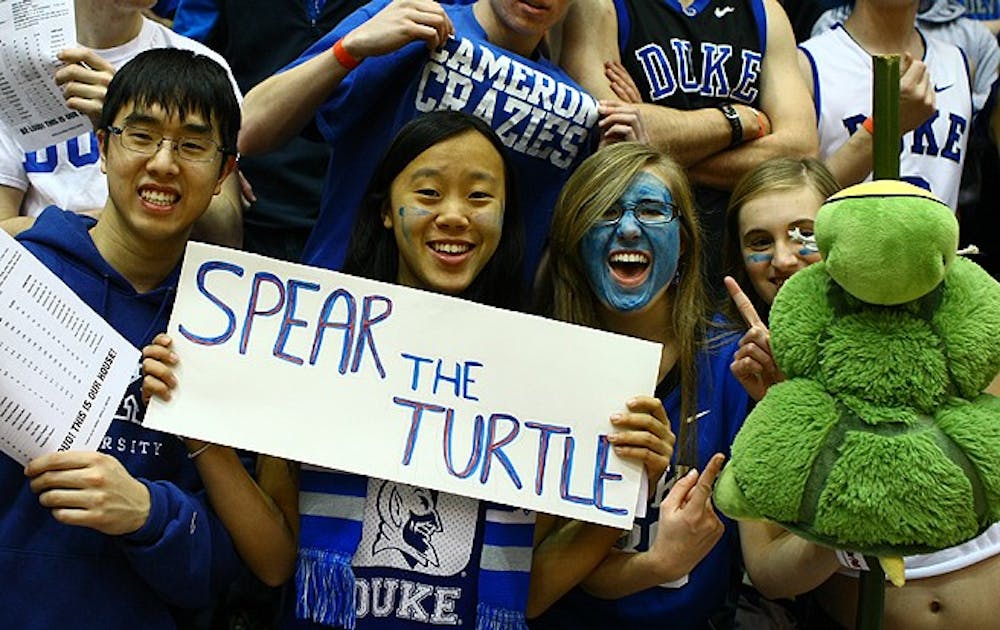As the final seconds ticked down in Duke’s 20-point victory against Maryland last weekend, chants of “not our rivals” cascaded through the confines of Cameron Indoor Stadium.
Although the win meant a solid recovery from a disastrous 27-point loss in Miami, it also held the added significance of being potentially the last time the Terrapins play at Cameron Indoor Stadium before they depart for the Big Ten in the 2014-15 season.
It is true—the Terps are not our rivals. They never have been, and once they depart the ACC they certainly never will be. But Maryland’s move to the Big Ten will signify the somber end of an era of ACC basketball.
Conference realignment has proven to be a messy game throughout the academic year—haggling over buyout prices and television contracts has ultimately left the leagues of college basketball’s traditional powers with deeper scars than can ever heal.
And ultimately, when Duke’s non-rival is finally a non-presence on its conference schedule, it will be the Blue Devils who suffer the most.
The last few years in college athletics have been one giant numbers game: Dollar signs seem to have been all that mattered to programs willing to sacrifice more than 50 years of history to be the geographically-displaced black sheep in a growing power conference.
But the biggest cost of Maryland’s departure from the ACC is something you cannot put a price tag on: Losing some of the most notable memories in Duke basketball history.
No single opponent will ever mean as much to the Blue Devils as North Carolina does. Steeped in history and tradition as basketball powers and just miles apart, the two schools combine to form the most notable rivalry in college athletics and arguably all of sports. Throughout this period when college basketball’s landscape is changing daily, there is nothing better for the ACC than N.C. State’s rise back into national relevance, creating a formidable conglomerate in the Triangle for which the conference is known.
Although Duke-Maryland contests will never have the allure of the Tobacco Road rivalry or the mutual disdain the Blue Devils share with N.C. State—even if the Terrapins hate Duke more than Duke hates them—some of the most memorable moments in Blue Devil history have come against Maryland.
Growing up a Duke fan, I quickly understood the significance of the Blue Devils’ rivalries and non-rivalries alike. Although some people point to Chris Duhon’s reverse layup in overtime to beat the Tar Heels in 2004 or the 82-50 drubbing of North Carolina at Cameron in 2010 as some of their finest Duke basketball memories, they pale in comparison to the games that helped me develop a passion for the sport of basketball.
I vividly remember watching Jason Williams lead Duke to a 10-point comeback in the final minute against the Terrapins in 2001 to send the game to overtime, a game that Duke eventually won and enshrined as the “Miracle Minute.”
The Blue Devils’ fate could not have looked bleaker later that year in the 2001 Final Four when they trailed Maryland by 22 points in the first half, only to storm back and play a near-perfect second half en route to their third national championship in program history.
And when Duke won its most recent national championship, the defining game that season was a win against the Terrapins on Feb. 13, 2010, when senior center Brian Zoubek had his coming-out party with a monstrous 16-point, 17-rebound performance.
Before Roy Williams joined the ranks of the ACC’s elite coaches, the conference’s second great coaching mind was Maryland’s Gary Williams. Before Duke fans had learned to hate the names Tyler Hansbrough, Sean May and Harrison Barnes, the Blue Devils’ arch nemeses were the Terrapins’ Juan Dixon, Lonny Baxter, Steve Blake and Chris Wilcox. And for many years in the late 1990s and early 2000s, when Duke had assembled some its greatest teams in program history, Maryland kept up stride for stride.
In an era when North Carolina was wildly inconsistent, the Terrapins were often the biggest game on Duke’s schedule.
So is Maryland the Blue Devils’ rival? Of course not. But the ACC’s loss of the Terrapins won’t prove to be inconsequential after the conference adds Syracuse, Pittsburgh, Notre Dame and Louisville in the coming years.
Losing Maryland and adding four strong basketball programs may help the ACC regain national prominence, but there are some things you just can’t replace—the Terrapins’ departure is definitely a loss worth mourning.
Get The Chronicle straight to your inbox
Sign up for our weekly newsletter. Cancel at any time.

